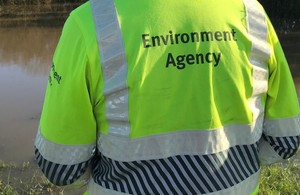Severn Trent Water fined over pollution of Pudding Brook
Today, Severn Trent Water Limited pleaded guilty at Telford Magistrates’ Court to polluting the Pudding Brook in Cleobury Mortimer, Shropshire with untreated sewage.

The company was fined £7,500 and ordered to pay £2,232.60 in costs, along with a £15 victim surcharge.
The charges were brought by the Environment Agency under Regulation 38(1)(a) and Regulation 12(1)(b) of the Environmental Permitting Regulations 2010.
On 29 September 2012 the Environment Agency received a report from a local resident that sewage was discharging from a manhole at Cleobury Mortimer and was consequently entering the Pudding Brook.
An Environment Agency officer spoke to Severn Trent Water’s Customer Operations Centre who confirmed that another incident had been reported the previous day but they had no further details. During this telephone call the officer asked for a Severn Trent Water crew to attend the site of the pollution to investigate the claims.
On arrival a camera survey by Severn Trent Water found that an electric cable had been installed incorrectly through the sewer pipe and was trapping rags and other debris leading to a blockage of the sewerage system. As a result sewage was flowing from a manhole into a drain and consequently into an adjacent stream. Downstream of the discharge the brook was cloudy in appearance and smelled of sewage and detergent whilst upstream the river was running clear.
Severn Trent Water’s contractors brought in a tanker and cleared the blockage and it was agreed with onsite Environment Agency Officers that further tankering would continue so that no further discharges would occur. However, a second tanker did not arrive.
On the following day it was reported to us again that sewage was still entering the stream and a further tanker was sent to site where it remained until the source of the blockage was removed and the sewer repaired.
A representative for Severn Trent Water attended interview under caution and apologised for the sewage discharges and said that the decision not to obtain a further tanker was made by Severn Trent Water which in hindsight was a decision it regretted.
Given that the Environment Agency was not present at the onset of the pollution it was difficult to accurately assess any impact caused. There were at least five separate sewage discharges over the three day period with potentially adverse effects causing harm to aquatic life. Had the Environment Agency been advised earlier the impact of the pollution could have been assessed and remedial action taken. In addition, had Severn Trent Water Limited followed the advice of its contractor on agreement with the Environment Agency officer and ordered a further tanker the pollution would not have continued for a further day.
Speaking after the case, Adam Shipp, an Environment Agency Officer, said:
This incident illustrates the importance of notifying us of an incident at the earliest opportunity. Even though on the first day of the incident Severn Trent Water had received four separate calls from members of the public telling them that sewage was entering the watercourse they failed to report anything to the Environment Agency and their contractors failed to inspect the nearby watercourse. Furthermore, a second tanker that was promised, to ensure that no further blockages occurred, was not sent to site leading to a further discharge of sewage.
On a positive note, and as a result of this incident, Severn Trent Water have re-trained their staff and contractors and have ensured that all their crews now carry maps of the sewer system.